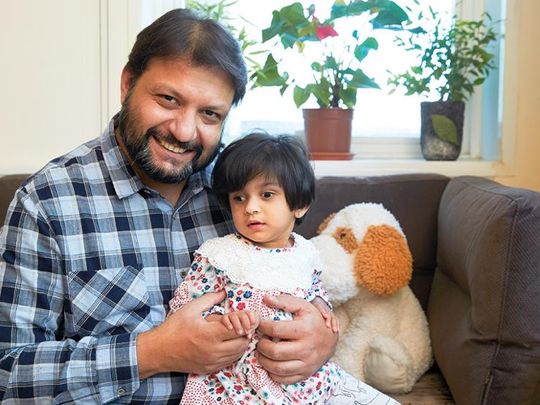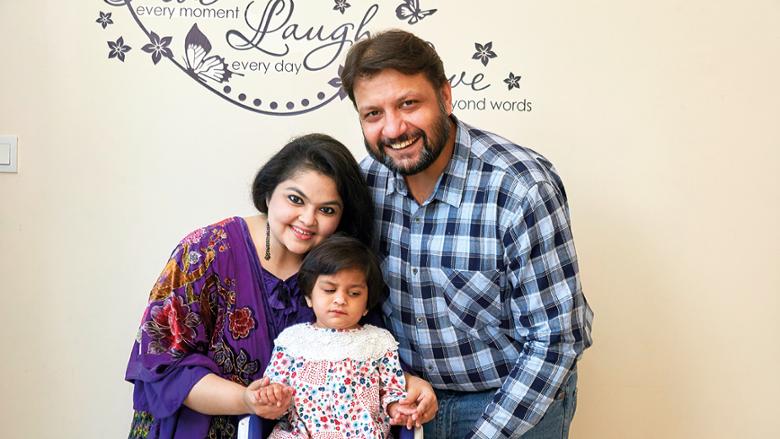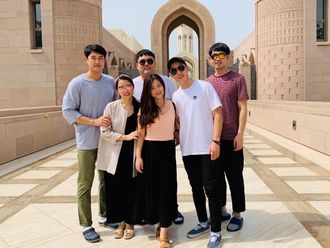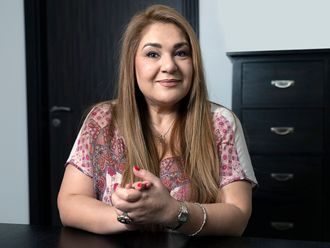
(As told to Zenifer Khaleel)
I was born in Dubai but grew up in Mumbai. My sister is seven years younger to me and I used to always pamper her, so I guess my paternal instincts developed at a young age.
In 2003 while I was working in Qatar, I was invited to a Diwali party by a friend and met his sister Prerna who was pursuing her higher studies. It was during this party that cupid struck, and we have been soulmates for the last 18 years and counting.
I came to Dubai in 2014 and joined an automotive company to work as a Business Development Manager.
Our daughter Athasha, who is three now, was born premature at 28 weeks in 2018. For three and a half months, she was in the NICU. She developed complications two weeks after her birth which resulted in Intra-Ventricular Haemorrhage.
I have interacted with children who are specially abled but none from my immediate family or close circle of friends. I had always heard and read about incidents of babies battling for life after birth at the NICU, but I could never imagine that one day my child would also be in a similar situation.
Initially, our only concern was to help her survive this jolt as she was on life support. Once her condition became stable and we got her home, we started to understand that there were other developmental delays. It was certainly a mixed bag of emotions. On the one hand we were thrilled to become parents to our beautiful daughter after nine years of marriage, but on the other, we were overwhelmed and engulfed with fear about her well-being and future.
After numerous visits to the hospital and rehabilitation centre for therapies and after scouring a zillion websites to educate ourselves, I realised that developmental delays are common, and parents are in constant search of professional help.
But Athasha’s case was more challenging because multiple issues make her condition severe.
Regular monitoring
Once we got her home from hospital we realised that she needs constant monitoring and nurturing not to mention regular and frequent visits to neurologists and therapists often on a weekly basis. Our little one is completely dependent on us for mobility – she still cannot sit, stand or walk on her own.
Since Prerna is a chartered accountant and her job was more stable and financially better, we weighed our options and decided that I would stay at home to look after Athasha, support her in the best way possible and help her to overcome challenges to lead a better life.

My day starts with preparing her meals and the fluids she needs to have. Because Athasha has digestions problems due to her condition, she needs to drink lukewarm cumin seed (jeera) water which is a natural way to aid digestion.
A short while later, I prepare her high-calorie special milk, which is additionally fortified at home with fresh cream and date syrup.
Later in the day she has at least two meals of solid foods but they need to be mashed/pureed as she has difficulty swallowing. Feeding her a meal takes close to an hour and and half as she cannot have large portions at a time. I also have to be careful that she does not choke on the food so we take our time and do it gently and with a lot of patience.
To ensure she gets the right amount of nutrients and gains weight, we fortify her food with ghee, peanut butter or organic coconut oil or a homemade protein mix.
The time between the feeds, I spend making her practice a range of activities which revolve around developing her vision, fine motor skills and gross motor skills. I am her therapist at home having learnt from professionals at the rehabilitation centre she attends. I ensure she adheres to her required physiotherapy, occupational therapy, and speech/feeding therapy sessions without fail.
In the evenings, I take her for a stroll in her pram to the nearby park to get a dose of sunshine and boost her social skills.
One of the favourite things I enjoy with her is tickling her feet while getting her ready for bed. It makes her laugh out loud. While cleaning her up after her meal or before taking her out or after returning from our outdoor trip, I sprinkle water on her face and make animated voices to increase her sensory perception. She loves those things.
Time for chores
When Athasha is resting or playing on her own, I do the household chores like the dishes, laundry, and grocery shopping. Prerna lends her support in cooking for us.
There are several things that we need to keep in mind when planning a trip outdoors. For one, the destination should be one that is suitable to Athasha’s needs. Since she has restricted movement and is mostly in her pram, we avoid going out for long hours as it gets very uncomfortable for her. We prefer meeting friends at home so that her feeding can be done in comfort. Winter is certainly a better time as we can take her to parks and beaches, and she can enjoy the outdoors while being comfortable on her play mat.
There are no designated parental roles for us. Prerna and I work as a team, and I cannot imagine doing this without her undying love and support.
As I am pursuing my MBA, the weekend mornings are busy with classes and assignments, so Prerna takes care of Athasha’s feeds and activities. On weekdays too, once she returns home from work, she helps in any way she can.
Being a stay-home dad has not been easy considering the fact that I have been employed since I was 21 and in the workforce for 20 years. This was a 180-degree shift in my daily routine and required a lot of effort to get accustomed to. But this has given me a renewed perspective and newfound respect for all the women and men who have chosen this as a way of life.
Athasha means the ‘Ultimate One’. Each child is unique and special in their own sweet way. We fondly call our daughter ‘The warrior princess’ and have hung a huge banner in the hall which compliments all the efforts our daughter is taking to embrace life.
Faith and patience are the tools used to handle situations which may not go as planned. She seldom throws any tantrums, but has her share of ups and downs. Love and warmth is all she yearns from us.
Slowly but surely is the slogan I have adopted to empower myself to look beyond the ordinary.












